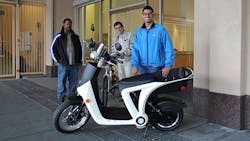Connectivity Enabling Manufacturing Innovation
Manufacturers, who have steadily been reaping the benefits from using the cloud to collect and store data, are now looking at various ways to further increase the value of the data.
At the recent PowerPlex 2016, the company’s user conference, Jason Blessing CEO of Plex Systems drew the connection between how data can impact product development.
"Plex customers are the manufacturing industry’s leaders and innovators, pioneering new technology and new strategic approaches every day,” said Jason Blessing. “Our customers transform the world every day.”
And no sooner than Blessing spoke, an electric scooter drove through the auditorium and landed on the stage.
While this might seem odd, the eScooter, manufactured by GenZe, a division of the Mahindra Group , is a perfect example of number of trends converging. The trend of increased urban living is giving rise to the issue of efficient transportation. Not only does the transportation need to be efficient but it also needs to have low emissions. Furthermore transportation is required to fit into the concept of “smart” cities.” These cities are connected, through a variety of sensors and provide real-time data, much like what factory floors now have available to them. The data is deployed to help cities run more efficiently.
GenZe developed the eScooter to provide urban mobility. They were careful to employ all technologies available to them. “Every scooter is connected to the Internet which allows us to understand how the consumers are using the products and to capture data on service,” says Deven Kataria, head of product development for GenZe.
While the eScooter was manufactured with the specific goal of assisting city dwellers, a future use of the eScooter could be to help in the last mile delivery. eCommerce customers' expectations of fast delivery can be carried out by these scooters.
Genze, which is manufactured in Michigan, uses Plex Systems as its ERP system to run an efficient paper-free factory. The facility is designed to be scalable as demand for the product grows.
While one factory might seem like a small market, Jim Shepard, vice president of strategy for Plex Systems explains that manufacturers are now moving toward smaller factories. “What we are seeing is that even companies who have $100 million in sales are choosing to have five smaller plants, rather than a couple of much larger ones.”
Shepard points out that with the connectivity that is now available, especially using the cloud, companies can open a factory as quickly as six months.
“The next phase is to dig deeper into the data in the cloud and apply it to every function across the company,” says Shepard. At the conference the company introduced enhanced products that allows visibility from data that originates from the shop floor, suppliers and even data between customers to help companies make better decisions.
Other tools that enable better decision will come from the use of technologies that are in early stages. Jason Prater, vice president of development for Plex Systems believes that AR (Augmented Reality) will have a big role when it comes to machine maintenance. “This technology will allow manufacturers to quickly and efficiently minimize downtime,” says Prater. (Note: Prater spoke with IndustryWeek about his views on future technology.)
As for VR (virtual reality) Prater sees this technology will be especially useful when it comes to training. And given the future workforce of millennials, this technology is especially appealing.
The ability to leverage technology is the foundation upon which future products will be created to meet society’s needs. At the end of the day it will be the realm of manufacturing to create the products, which was the rallying cry of Plex Systems conference which carried a tagline of “Power Plex 2016 #We Make Things.”
